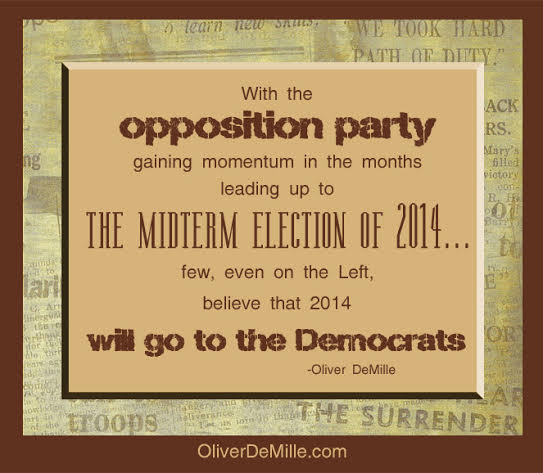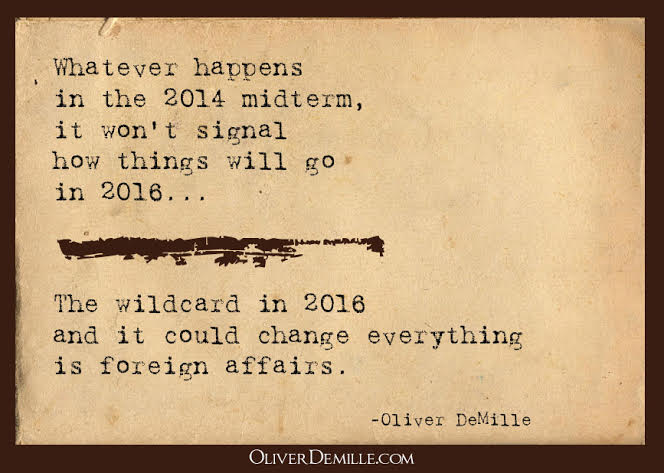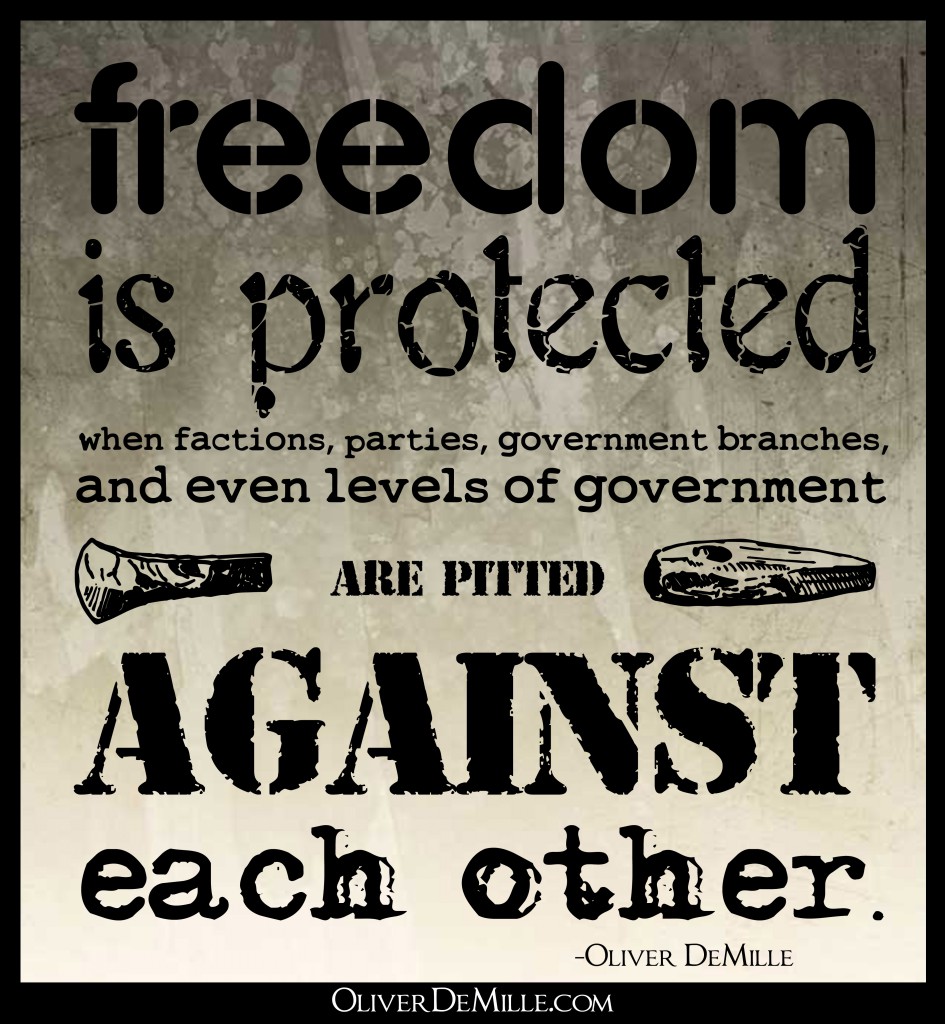The Achilles of 2016 by Oliver DeMille
July 16th, 2014 // 9:08 am @ Oliver DeMille
Setting the Stage
When Barack Obama was elected in 2008, Republicans went into retreat. Pundits wondered if they’d ever recover, especially after the reversals they’d already experienced in the election of 2006. Some spoke in lasting terms, suggesting that Republicans had become a regional party at best.
Then came the historic Republican victory of 2010, a midterm election that put the GOP in charge of the House and gave it major gains in the Senate. It seemed that a reversal had come at last. A number of conservatives predicted continued victories in the 2012 election and projected that President Obama’s days in the White House were numbered.
With the opposition party gaining momentum in the months leading up to the midterm election of 2014, a number of politicos are forecasting another Republican sweep—some on a major scale that wins control of the entire Congress, others of a smaller but still respectable victory Few, even on the Left, believe that 2014 will go to the Democrats.
In this environment, some on the Right are vocally enthusiastic about the 2016 Presidential election. One elected official said he now thinks Mitt Romney will run again and win, and he has been widely quoted by a number of conservatives hoping for a major change in the White House.
The Common Wisdom
Thoughts about the 2016 election seem to split by geography. Talk to people in most red states, and they’re sure Romney or some other Republican will win this time. In blue states, the opposite is true, and Hillary Clinton is extremely popular. The mainstream media overwhelmingly leans in the direction of “Hillary is the clear front runner,” and most of the alternative (largely conservative) media is hesitant to pick a winner this early—meaning it too thinks Hillary has a lead.
The common wisdom now seems to agree on several things:
- Republicans will likely post some gains in the midterm election in November, but whether these are large or small it won’t have a huge impact on federal policy. The White House will block any drastic changes, and maintain its current agenda, albeit stifled a bit. Voters aren’t likely to see any real change of direction.
- Whatever happens in the 2014 midterm, it won’t signal how things will go in 2016. The 2006 and 2008 elections went in the same direction, but the 2008 and 2010 elections went down totally different tracks. We won’t know what’s going to happen in 2016 until it does.
- Hillary Clinton is definitely ahead right now, and 2016 is her election to lose. All indications are that, regardless of who the Republican nominee is, the strongly blue and red states will vote as expected, and the election will come down to the votes of Hispanics, women, and independents in a few swing states. Hillary will win big with the first two, and probably post a less spectacular win with the third as well.
The Unrest
The wildcard in 2016—and it could change everything—is foreign affairs. On the surface, this should be a strength for Hillary, who traveled widely as the First Lady and both shaped policy and set travel records as Secretary of State. But something deeper is at play. If world events continue to heat up, it could weaken Mrs. Clinton.
Many Americans see Putin’s antics and Syria thumbing its nose at the United States as direct failures of the Obama Administration, not to mention the growing sense that China is replacing us as the up and coming power in the world. Many Americans see Clinton’s role as Secretary of State as partly responsible for these very problems—or for not more effectively addressing them.
Watching rockets rain down on Israel is the worst possible optic for the future of the Democratic Party. (Of course, this is a much bigger issue than American politics, but it matters deeply how America uses its influence in such situations.) If the international incidents continue, or repeat or escalate at any point close to the 2016 election, many voters (most importantly the swing voters) will increasingly see Democratic leadership as weak, naïve and misguided, and yearn for a “strong” Republican-style leader who brings America back to its rightful place in the world.
If Benjamin Netanyahu were running for president in such an environment, it might be a Reaganesque sweep. It would have been fertile ground for Chris Christie, but Bridgegate may have put an end to his viability as the nominee. International unrest could easily increase support for iconic Republican leaders like Mitt Romney, Jeb Bush, et al. Romney may well consider another run on such grounds.
In fact, the current level of international unrest could have a huge influence on which Republicans (and even Democrats) ultimately run and who wins. Rand Paul is very popular among Republicans, for example, except when he starts talking about national security in what many of his base consider isolationist terms. And Christie might look better to voters in the face of a serious international threat.
The Outcome
In the famous Nixon-Kennedy presidential debate, the large majority of those who listened on the radio thought Nixon had won. Those who watched on television, however, thought Kennedy had the clear upper hand. He looked cool, calm, and excited about the future of America, while Nixon looked driven and frustrated. Obviously, Kennedy won the election.
The 2016 election will likely provide similarly interesting optics. How will Hillary and her opponent look on camera, compared to each other? This may be the true swing-point of the election.
But there is another possibility. What if the picture foremost in American minds at the time of the debates and election day includes a major national security issue? If China becomes more aggressive, or rockets are raining down on Israel, or anything similar, a Republican “tear down this wall” moment might sway the whole thing.
In our current world, this is not just possible but very possible. A candidate can’t count on it, but a front runner can’t be sure it won’t happen either.
 Oliver DeMille is the New York Times, Wall Street Journal and USA Today bestselling co-author of LeaderShift: A Call for Americans to Finally Stand Up and Lead, the co-founder of the Center for Social Leadership, and a co-creator of TJEd.
Oliver DeMille is the New York Times, Wall Street Journal and USA Today bestselling co-author of LeaderShift: A Call for Americans to Finally Stand Up and Lead, the co-founder of the Center for Social Leadership, and a co-creator of TJEd.
Among many other works, he is the author of A Thomas Jefferson Education: Teaching a Generation of Leaders for the 21st Century, The Coming Aristocracy, and FreedomShift: 3 Choices to Reclaim America’s Destiny.
Oliver is dedicated to promoting freedom through leadership education. He and his wife Rachel are raising their eight children in Cedar City, Utah
Category : Blog &Citizenship &Community &Culture &Current Events &Government &Leadership &Liberty &Politics
The Three Economies by Oliver DeMille
July 11th, 2014 // 9:42 am @ Oliver DeMille
The Hidden Economy
 There are three economies in modern society. They all matter. But most people only know about two of them. They know the third exists, in a shadowy, behind-the-scenes way that confuses most people. But the first two economies are present, pressing, obvious. So people just focus on these two.
There are three economies in modern society. They all matter. But most people only know about two of them. They know the third exists, in a shadowy, behind-the-scenes way that confuses most people. But the first two economies are present, pressing, obvious. So people just focus on these two.
A couple of recent conversations brought these economies even more to the forefront of my thinking. First, I was meeting with an old friend, touching base about the years since we’d talked together. He mentioned that his oldest son is now in college, and how excited he is for his son’s future. I asked what he meant, and he told me an interesting story.
Over twenty years ago he ran into another of our high school friends while he was walking into his community college admin building. The two greeted each other, and they started talking. My friend told his buddy that he was there to dis-enroll from school. “I just can’t take this anymore,” he told him. “College is getting me nowhere.”
“Well, I disagree,” his buddy said. “I’m here to change my major. I’m going to get a teaching credential and teach high school. I want a steady job with good benefits.”
A Tale of Two
Fast forward almost thirty years. My friend ran into his old buddy a few weeks ago, and asked him what he’s doing. “Teaching high school,” he replied.
“Really? Well, you told me that was your plan. I guess you made it happen. How much are you making, if you don’t mind me asking?”
When his friend looked at him strangely, he laughed and said, “I only ask because you told me you wanted a steady job with good benefits, and I wanted to get out of school and get on with real life. Well, I quit school that day, but I’m still working in a dead end job. Sometimes I wonder what I’d be making if I had followed you into the admin building that day and changed majors with you.”
After a little more coaxing, the friend noted that he was making about $40,000 a year—even with tenure and almost thirty years of seniority. “But it’s steady work, like I hoped. Still, I’ve got way too much debt.”
After telling me this story, my friend looked at me with what can only be described as slightly haunted eyes. “When he told me he makes $40K a year, I just wanted to scream,” my friend said.
“Why?” I asked.
He could tell I didn’t get what he was talking about, so he sighed and looked me right in the eyes. “I’ve worked 40 to 60 hour weeks every month since I walked off that campus,” he told me. “And last year I made about $18,000 working for what amounts to less than minimum wage in a convenience store. I should have stayed in college.”
That’s the two economies. One goes to college, works mostly in white-collar settings, and makes from thirty thousand a year up to four times that. Some members of this group go on to professional training and make a bit more. The other group, the second economy, typically makes significantly less than $50,000 a year, often half or a third of this amount, and frequently wishes it had made different educational choices.
The people in these two economies look at each other strangely, a bit distrustfully, wondering what “could have been” if they’d taken the other path.
That’s the tale of two economies.
II.
Which brings me to my point. Ask members of either economy for advice about education and work, and they’ll mostly say the same thing. “Get good grades, go to college, get a good career. Use your educational years to set yourself up for a steady job with good benefits.” This is the advice my grandfather gave my father at age twenty, and the same counsel my dad gave me after high school. Millions of fathers and mothers have supplied the same recommendations over the past fifty years.
This advice makes sense if all you know are the two economies. Sadly, the third economy is seldom mentioned. It is, in fact, patently ignored. Or quickly discounted if anyone is bold enough to bring it up.
A second experience illustrates this reality. I recently visited the optometrist to get a new prescription for glasses. During the small talk, he mentioned that his younger grandchildren are in college, but scoffed that it was probably a total waste of time. “All their older siblings and cousins are college graduates,” he said, “and none of them have jobs. They’ve all had to move back home with their parents.”
He laughed, but he seemed more frustrated than amused. “It’s the current economy,” he continued. “This presidential administration has been a disaster, and it doesn’t look like anyone is going to change things anytime soon. I don’t know what these kids are supposed to do. They have good degrees—law, accounting, engineering—but they can’t find jobs. Washington has really screwed us up.”
I nodded, and brought up the third economy, though I didn’t call it that. What I actually said was: “There are lots of opportunities in entrepreneurship right now.” He looked at me like I was crazy. Like maybe I had three heads or something. He shook his head skeptically.
“Entrepreneurship is hard work,” I started to say, “but the rewards of success are high and…”
He cut me off. Not rudely, but like he hadn’t really heard me. That happens a lot when you bring up the third economy.
“No,” he assured me, “college is the best bet. There’s really no other way.”
I wasn’t in the mood to argue with him, so I let it go. But he cocked his head to one side in thought and said, slowly, “Although…” Then he shook his head like he was discounting some thought and had decided not to finish his sentence.
“What?” I asked. “You looked like you wanted to say something.”
“Well,” he paused…then sighed. I kept looking at him, waiting, so he said, “The truth is that one of my grandsons didn’t go to college.” He said it with embarrassment. “Actually, he started school, but then dropped out in his second year. We were all really worried about him.”
A “Real” Job
He paused again, and looked at me a bit strangely. I could tell he wanted to say more, but wasn’t quite sure how to go about it.
“What happened?” I prompted.
“To tell you the truth, I’m not really sure. He started a business. You know, one of those sales programs where you build a big group and they buy from you month after month. Anyway, he’s really doing well. He paid off his big house a few years ago—no more mortgage or anything. He has nice cars, all paid for. And they travel a lot, just for fun. They fly chartered, real fancy. He and his wife took us and his parents to Hawaii for a week. He didn’t even blink at the expense.”
“That’s great,” I told him. “At least some people are doing well in this economy.”
He looked at me with that strange expression again. “I’m not sure what to make of it,” he said. “I keep wondering if he’s going to finish college.”
I was surprised by this turn of thought, so I asked, “So he can get a great education, you mean? Read the classics? Broaden his thinking?”
He repeated the three heads look. “No. He reads all the time—doesn’t need college for that. I want him to go back to college so he can get a real job.”
I laughed out loud. A deep belly laugh, it was so funny. I didn’t mean to, and I immediately worried that I would offend him, but he grinned. Then he shook his head. “I know it’s crazy, but I just keep worrying about him even though he’s the only one in the family who is really doing well. The others are struggling, all moved back in with their parents—spouses and little kids all in tow. But they have college degrees, so I keep thinking they’ll be fine. But they’re not. They’re drowning in student debts and a bunch of other debts. It just makes no sense.”
America Needs to Get It
He sighed and talked bad about Washington again. Finally he said, “I’ve poured so much money into helping those kids go to college, and now the only one who has any money to raise his family is the one who dropped out. It just doesn’t make any sense.” He kept shaking his head, brow deeply furrowed.
I left his office thinking that he’s so steeped in the two economies he just doesn’t really believe the third economy exists. He just doesn’t buy it, even when all the evidence is right there in front of him.
He’s not alone. The whole nation—most of today’s industrialized nations, in fact—are right there with him. We believe in the two economies, high school/blue collar jobs on the one hand, and college/white collar careers on the other. Most people just never quite accept that the entrepreneurial economy is real.
It’s too bad, because that’s where nearly all the current top career and financial opportunities are found. The future is in the third economy, for those who realize it and get to work. If you’ve got kids, I hope you can see the third economy—for their sake. Because it’s real, and it’s here to stay.
The first two economies are in major decline, whatever the so-called experts claim. Alvin Toffler warned us in his bestseller FutureShock that this was going to happen, and so did Peter Drucker, back when they first predicted the Information Age. Now it’s happening.
I hope more of us realize the truth before it’s too late. Because China gets it. So does India, and a bunch of other nations. The longer we take to get real and start leading in the entrepreneurial/innovative economy (the real economy, actually), the harder it will be for our kids and grandkids. The third economy will dominate the twenty-first century. It already is, in fact. Whether we’ve chosen to see it yet or not.
 Oliver DeMille is the New York Times, Wall Street Journal and USA Today bestselling co-author of LeaderShift: A Call for Americans to Finally Stand Up and Lead, the co-founder of the Center for Social Leadership, and a co-creator of TJEd.
Oliver DeMille is the New York Times, Wall Street Journal and USA Today bestselling co-author of LeaderShift: A Call for Americans to Finally Stand Up and Lead, the co-founder of the Center for Social Leadership, and a co-creator of TJEd.
Among many other works, he is the author of A Thomas Jefferson Education: Teaching a Generation of Leaders for the 21st Century, The Coming Aristocracy, and FreedomShift: 3 Choices to Reclaim America’s Destiny.
Oliver is dedicated to promoting freedom through leadership education. He and his wife Rachel are raising their eight children in Cedar City, Utah
Category : Blog &Business &Citizenship &Community &Culture &Current Events &Economics &Education &Entrepreneurship &Generations &Leadership &Mini-Factories &Statesmanship
Three Trends vs. Freedom by Oliver DeMille
July 2nd, 2014 // 12:57 am @ Oliver DeMille
Rewriting the Future
 There are at least three great political-economic changes that have occurred in the United States in the last twenty years. Each is rewriting what our world and future looks like, and each is causing a decline of freedom. But none of them are inevitable.
There are at least three great political-economic changes that have occurred in the United States in the last twenty years. Each is rewriting what our world and future looks like, and each is causing a decline of freedom. But none of them are inevitable.
The first trend is the huge growth of government, including government size, spending, and regulation in so many parts of our lives. The second is the major decline of success and opportunity for the middle class. The third is the increasingly important rise of China.
Put these three together, and the future seems bleak to many Americans—even if they aren’t sure why.
The irony is that the first two trends are, in fact, related. Despite what many in Washington say, the massive growth of government is at least contributing to—and may be the main cause of—the growing middle class squeeze.
Breaking the American Dream
Sadly, too many in government don’t see it that way. For some reason, a lot of people witness the deepening plight of the middle class and, inconceivably, think that the only solution is bigger and bigger government. More programs, more spending, more intervention, more regulation.
Yet the historical record is clear. Every major growth of the U.S. government has been followed by a decrease in the middle-class standard of living. Today, after over sixty years of unprecedented expansion of government, the average adult American worker can no longer provide a quality standard of living for a family. In fact, two working adults in a family seldom make ends meet.
Families are smaller, the American Dream of home ownership is switching to a European model of rentals, and more people are joining the lower classes—where family debt or government money, or both, are necessary to get by.
In fact, home ownership, once a staple of middle class lifestyle, is increasingly a financial burden on many people (see “Americans think owning a home is better for them than it is,” The Washington Post, April 21, 2014). In an article entitled “The American Middle Class Is No Longer the World’s Richest” (April 22, 2014), The New York Times reported that the U.S. middle class is getting poorer and as a result “most American families are paying a steep price for high and rising income inequality.”
Middle Going Down
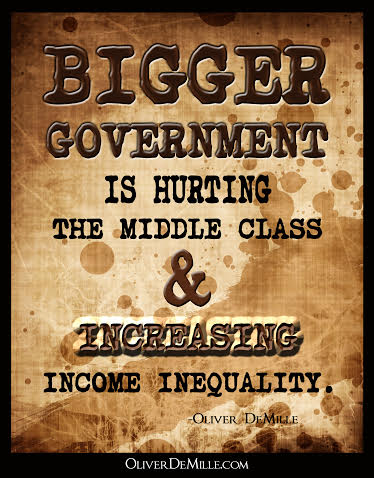 The middle class young are being hit especially hard. Over 40% of today’s Millennial Generation young people move back home after leaving for college or work. As a group, they are the first generation since World War II to be significantly worse off financially than their parents. They aren’t buying cars, they aren’t buying houses, and they aren’t getting married; they’re living at home, hoping something will change in the economy to bring more opportunity (see Paul Taylor, CBS This Morning, April 26, 2014).
The middle class young are being hit especially hard. Over 40% of today’s Millennial Generation young people move back home after leaving for college or work. As a group, they are the first generation since World War II to be significantly worse off financially than their parents. They aren’t buying cars, they aren’t buying houses, and they aren’t getting married; they’re living at home, hoping something will change in the economy to bring more opportunity (see Paul Taylor, CBS This Morning, April 26, 2014).
Speaking of the American middle class, Harvard’s Lawrence Katz wrote: “In 1960, we were massively richer than anyone else. In 1980, we were richer. In the 1990s, we were still richer.” Today we aren’t (op cit. “The American Middle Class…”).
A simple comparison of low regulation in 1960 to increased but still (by today’s standards) low regulation in 1980, then increasing regulation in the 1990s and massive regulatory increases between 2000 and today show a clear pattern: when we raise regulation and grow government, we hurt the middle class and grow the lower class.
Yet many experts suggest that the solution is more, not less, government intervention, programs, spending, and regulation (see ibid). This mirrors the old quip that “the beatings will continue until the morale improves,” except in this case “economy- and innovation-killing regulation will increase until the economy improves.” In reality, the opposite is occurring—bigger government is hurting the middle class and increasing income inequality.
The Choice
Whatever the experts think, the American people have a deep sense that something is wrong. Approximately 70 percent don’t believe America is on the right track (ibid).
This doesn’t translate directly to elections, however. A lot of people think that government is the solution to our economic problems, not the cause of some of our deepest challenges.
If current trends continue, China’s increasingly competitive economy will make a reality of what many in the American middle class now believe: that our children and grandchildren will face a declining standard of living while the same generations in China will see major economic increases.
Like a George Orwell satire, we continue to do exactly what causes more problems. Yet perhaps the greatest American contribution to history—a deep belief in and commitment to moral freedom and free enterprise—goes mostly unheeded. America needs to give its own greatest export (freedom) a try.
Freedom works, as we have shown for over two centuries. Whether America declines or flourishes in the 21st Century will be directly attached to whether we choose bigger government or increased freedom. And it’s up to the middle class to make this decision and make it stick.
 Oliver DeMille is the New York Times, Wall Street Journal and USA Today bestselling co-author of LeaderShift: A Call for Americans to Finally Stand Up and Lead, the co-founder of the Center for Social Leadership, and a co-creator of TJEd.
Oliver DeMille is the New York Times, Wall Street Journal and USA Today bestselling co-author of LeaderShift: A Call for Americans to Finally Stand Up and Lead, the co-founder of the Center for Social Leadership, and a co-creator of TJEd.
Among many other works, he is the author of A Thomas Jefferson Education: Teaching a Generation of Leaders for the 21st Century, The Coming Aristocracy, and FreedomShift: 3 Choices to Reclaim America’s Destiny.
Oliver is dedicated to promoting freedom through leadership education. He and his wife Rachel are raising their eight children in Cedar City, Utah
Category : Aristocracy &Blog &Citizenship &Community &Current Events &Generations &Government &History &Leadership &Liberty &Mission &Politics &Statesmanship
Were the Founders Lawyers or Entrepreneurs? A Surprising Answer
July 1st, 2014 // 12:47 am @ Oliver DeMille
A Difference Changes Everything
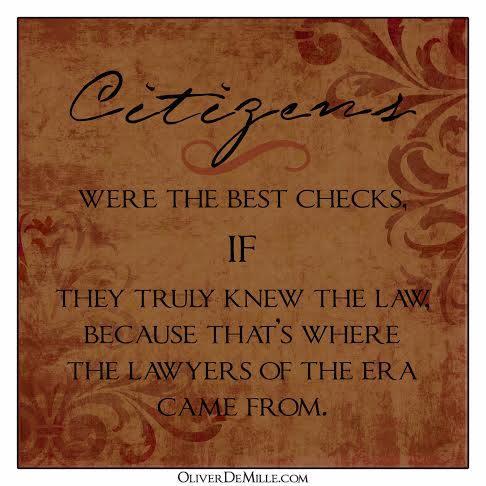 “You frequently mention that free nations have a lot of entrepreneurs,” my friend said, “but I’ve been studying the American Founding era and it turns out that many of the framers were lawyers. Why don’t you tell people that a lot more of us should go into law?”
“You frequently mention that free nations have a lot of entrepreneurs,” my friend said, “but I’ve been studying the American Founding era and it turns out that many of the framers were lawyers. Why don’t you tell people that a lot more of us should go into law?”
It was a good question, so I nodded my head. “You’re right, but there is one big difference between law at the time of the founding and law today. The difference is so big, in fact, that it changes everything. Well, maybe not everything. But it changes the whole way law and freedom interact.”
I cocked my head to one side. “Actually, another friend of mine recently sent me a note about the same thing. He had always thought that most of the framers were merchants or farmers, but he was surprised to find out how many of them were lawyers. As much as I’ve said about the value of entrepreneurs to freedom, I guess I better mention how the legal profession fits.”
“I agree,” he responded. “If the founders are a good example of a generation that increased freedom, why wouldn’t we just emulate them on this?”
“I wish we could,” I told him. “But it’s illegal.”
Lawyers and Laws
He laughed…but when he noticed that I wasn’t laughing he stopped. “You’re not joking?”
“No, I’m not. It’s illegal be the kind of lawyer that many of the framers were. That’s the big difference I was telling you about.”
He looked really interested, so I continued.
“Let me ask you a question,” I began. “What would happen if you read a bunch of history, legal books, judicial decisions in court cases, and important government documents, and then decided to put a sign on the front of your house with your name, followed by “Attorney at Law”? You do this without attending law school, just lots of hard study and a good understanding of law and freedom, and you start marketing for clients?”
“Uh, I’d be in trouble,” he retorted. “You have to have a license to practice law. Go before the Bar, get state approval, and all that. And you have to graduate from law school in order to do this. I looked into it years ago when I was making career decisions.”
“So you have to graduate from a state-approved law school, right?”
“Of course.”
“Is that what the framers did to become lawyers?” I asked.
“I’m not sure. Some did, I think. Like Jefferson. Though I remember reading that Patrick Henry took the Bar without law school. Come to think of it, so did Jefferson. He studied law with mentors, but not at an official law school. Same with…well, a lot of the framers. Law schools didn’t come until later.”
“That’s the difference,” I told him. “In the founding era, depending on the colony, you could read and take the bar, or work as an apprentice, or read under the tutelage of a mentor, or in most of early American history and our Westward expansion a person could just practice law by hanging out a shingle and taking on clients. In our day, you have to graduate from a state approved law school and then get personal state approval in the form of a license. It’s a totally different process.”
Goal and Outcome
“Are you saying the way we do it now is worse?” he asked.
“That depends on how you are measuring it. A lot of people will say that the type of training students get in modern law schools is much better than when early lawyers just read a lot of books and cases. They’ll say that the modern methods turn out much better professionals than the old way ever could.
“And, honestly,” I continued, “this argument has merit. But only if the goal is professionalism and maintenance of the legal profession. In the founding era, the goal was different.”
“What was it?”
“It was to check the government. Think about it: When law schools have to be approved by the government, and the accreditation agencies for law schools have to be approved by the government, and all licensing for attorneys is overseen by the government, the attorneys are bound—at some level—by the government. The government can take away their licensing and their livelihood at any time, so lawyers are bound to do things in the approved and accepted ways. They can check the government only in ways the government allows.
“You can argue that this is a good system, or not. But it is very different from how the founders saw it. They viewed lawyers as powerful checks on government, as self-made experts who read the law, studied history, pored over court cases and government documents and the writings of the freedom philosophers—and used all this wisdom to keep the government honest. To keep it in its proper role. To keep it in place. Not to impress it or bow to its regulations and authority, but to stop it when needed.
A Broken Check
“But if the government licenses lawyers and every step of becoming lawyers, they can’t really go around checking the government at every turn. At least not at the same level as if they are truly independent. For example, when Edmund Burke wanted to warn the British Parliament against going to war against the American colonies on March 22, 1775, he told them they should avoid such a war because so many Americans were students of the law.”
I then shared Burke’s words when he said:
Permit me, Sir, to add another circumstance in our colonies, which contributes no [small] part towards the growth and effect of this untractable spirit. I mean their education. In no country perhaps in the world is the law so general a study…. [A]ll who read, and most do read, endeavor to obtain some smattering in that science. I have been told by many an eminent bookseller, that in no branch of his business, after tracts of popular devotion, were so many books as those on the law exported…. The colonists have now fallen into the way of printing them for their own use. I hear that they have sold nearly as many of Blackstone’s Commentaries in America as in England…. This study renders men acute, inquisitive, dexterous, prompt in attack, ready in defense, full of resources…. They [foresee] misgovernment at a distance; and snuff the approach of tyranny in every tainted breeze.
I sighed. “The founding era had truly independent lawyers who owed nothing to government. And many American citizens read and became lawyers, not through official law schools like today, but as checks on government. That’s a whole different system. Citizens were the best checks, if they truly knew the law, because that’s where the lawyers of the era came from.”
My friend was nodding, so I added, “In fact, the same is true of teachers. In the founding era, teachers were hardly ever required to be certified or licensed like they are today. They just studied, read, and started tutoring and teaching. Those who were really good naturally attracted more students—same with lawyers attracting clients.
Freedom and Licensing
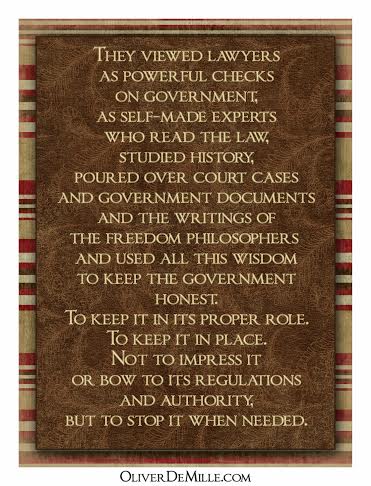 Again, today, certified teachers really work for and answer to the state—the entity that certifies them – and in most cases, pays their salaries. Independent teachers who just read and start teaching are more suited to be good checks on government, not its outreach program.
Again, today, certified teachers really work for and answer to the state—the entity that certifies them – and in most cases, pays their salaries. Independent teachers who just read and start teaching are more suited to be good checks on government, not its outreach program.
“The same can be true of any government licensing, such as psychiatric experts. Those who are licensed go to court and give their expert opinions, but people usually don’t take note that these experts can only make a living if they stay licensed. They must comply with state needs, trends and whims. They aren’t independent experts, they are naturally prone to support the government—at least more than they need to be real checks on it. If they don’t, they risk their licensure.
“Of course, if you ask many attorneys, certified teachers, psychiatric experts or others in this position, they’ll often assure you that this isn’t the case. But how can it not be? In any other setting this would be a clear conflict of interest. They’re dependent on the government, given their standing by government, and trained according to government-approved curriculum; this potentially weighs in every situation.
“They may feel that this isn’t full government control, because they can work within the system to fight for various views, and this is true. But it still amounts to a de facto conflict of interest, and it certainly doesn’t promote checks on government abuse the way a non-licensed system used to do.
“So to say that the American Founders had a lot of lawyers is to say that there were a lot of regular people checking the government, while to say that we have a lot of lawyers today is to say we have lots of professionals at least somewhat beholden to the government. The same applies to certified teachers and any others licensed by government.
Following the Old Route
“If society wants lots of licensing, then that’s what we’ll get. But let’s not believe that it creates checks on government abuse. If anything, it does the opposite. When Tocqueville said in Democracy in America that as the lawyers go, so goes America, it was too true! When lawyers were a clear, independent, unregulated check on government, the government was much smaller and more frequently checked. Today, when lawyers and credentialed teachers and many others are beholden to government for their continued licensing, there are fewer checks. Still some, but fewer.
“Of course, some of the lawyers, teachers and others still follow the old route—they are licensed, yes, but they read deeply, think about freedom and are a credit to their professions in the way they stand up for what is right. But the system is still very different, and anyone who cares about freedom should clearly understand the differences.”
“This all makes me want to be a lawyer,” my friend said. “To get licensed and use my law school education to really fight even more for freedom.”
“Bravo,” I replied. “I know a number of lawyers and teachers and others who do the same. I think they are courageous and vital freedom fighters. I also believe that we need a lot of similar leaders in the non-licensed areas, like entrepreneurship, the arts, private school teaching, and so on. If everyone does his or her best in his/her chosen life purpose, that’s where we’ll get the best results as a society.
A Little Bit of Lawyer
“But,” I paused, “this assumes that nobody’s best life purpose is to work daily to reduce freedom. That would be a tragedy, and I don’t believe this is where anyone should dedicate his or her life. Sadly, sometimes people don’t realize this is what they’re doing. We should all take stock of how our daily work is impacting freedom—no matter our profession, career field, job, or work.”
“If we’re hurting freedom, even just because that’s what our career tends to do, we have to change something,” he concluded. Then he paused, pondered, and added, “To sum up, I guess the founders were all a little bit lawyer, a little bit entrepreneur, and a little bit leader.”
“They even had a word for this,” I agreed. “Several words, in fact. Citizen. Voter. Elector. Constituent. American. All of these used to mean you were a little bit lawyer, a little bit entrepreneur, a little bit leader. You’re right.”
He smiled as he nodded. Then he said slowly, “That’s what we need today.”
(Learn about the 3 major ways to deal with these trends in FreedomShift, by Oliver DeMille)
 Oliver DeMille is the New York Times, Wall Street Journal and USA Today bestselling co-author of LeaderShift: A Call for Americans to Finally Stand Up and Lead, the co-founder of the Center for Social Leadership, and a co-creator of TJEd.
Oliver DeMille is the New York Times, Wall Street Journal and USA Today bestselling co-author of LeaderShift: A Call for Americans to Finally Stand Up and Lead, the co-founder of the Center for Social Leadership, and a co-creator of TJEd.
Among many other works, he is the author of A Thomas Jefferson Education: Teaching a Generation of Leaders for the 21st Century, The Coming Aristocracy, and FreedomShift: 3 Choices to Reclaim America’s Destiny.
Oliver is dedicated to promoting freedom through leadership education. He and his wife Rachel are raising their eight children in Cedar City, Utah
Category : Blog &Citizenship &Community &Current Events &Education &Entrepreneurship &Generations &Government &History &Leadership &Liberty &Mini-Factories &Mission &Politics &Statesmanship
Friends of Foes? (Obama’s Liberal Detractors Grow) by Oliver DeMille
June 30th, 2014 // 6:57 am @ Oliver DeMille
President Versus
Modern citizens tend to see what happens in Washington as mainly partisan, 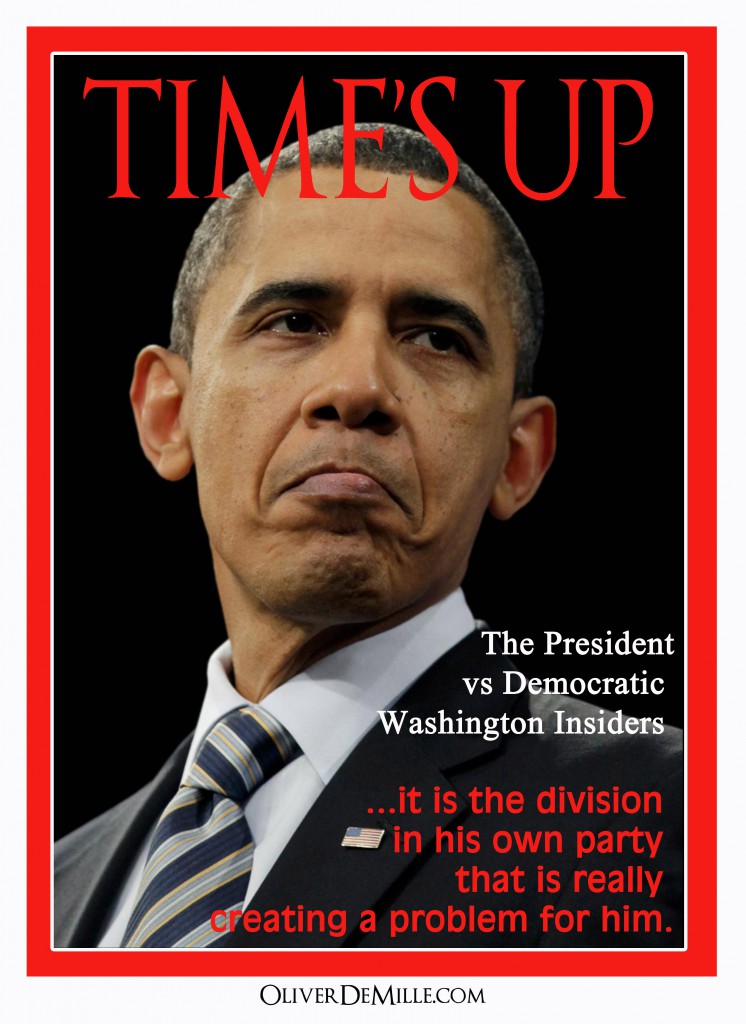 and certainly party disputes are a major part of our governance. But they aren’t the only conflict in play.
and certainly party disputes are a major part of our governance. But they aren’t the only conflict in play.
In fact, James Madison pointed out in Federalist 10 that freedom is protected when factions, parties, government branches, and even levels of government are pitted against each other.
When Democrats in the White House find themselves arguing with Democrats in the Congress, for example, or when House Republicans face off against conservative governors and other state- and local-level Republican officials, the normal power of partisan politics can be reduced.
Everyone tends to benefit when this happens, because it creates an additional check on any part of government seeking too much power.
If anything, it is unfortunate that this doesn’t occur more often.
Right now the Democratic Party is dealing with just such an internal battle. It takes the form of the President versus Congressional candidates who are running for office this year and need to break from the White House in order to get enough votes. Also the President versus Hillary Clinton and other potential Democratic presidential candidates who are trying to build their own following.
It also includes the President versus various Democratic Washington insiders who feel that his more controversial policies are hurting the Party. And the President versus past members of his administration, current members who keep “leaking” inside scoops to the media, and the usually liberal media that is now pressing the President more aggressively than at any point since his election in 2008.
Fighting Allies
In short, it seems to be the President versus a lot, if not most, of his own Party—not just in Washington but in many states and locales as well.
George Will noted that the President has faced strong opposition among his own party in a number of major crises during the past year. Such conflicts include sharp criticism about the failures of the Obamacare website, the Snowden revelations about government spying on its own people, the IRS scandal, the White House “negotiating with terrorists” and swapping prisoners with the Taliban, the President’s seeming weakness in dealing with Putin and the Ukraine, the controversial EPA rules, Democratic opposition to Presidential appointments (e.g. Larry Summers), Democratic resistance to the President’s attempts to use force in Syria, etc.
All in all, the President’s own party is rendering his policy agenda and even his responses to national crises very difficult. Oh, and no surprise, the Republicans are doing their part to oppose him as well. But it is the division in his own party that is really creating a problem for him—the word popping up now in the press is “incompetence” or “a lack of presidential competence.”
Most national Democratic leaders are quick to verbally support the President in conversations with Republicans, but among their constituents and on Capitol Hill they are increasingly going their own way. Even when it directly conflicts with the Administration.
As the elections heat up for 2014 and in preparation for the big one in 2016, many Democrats are finding that Obamacare and perceived problems with the Obama Administration are hurting them among voters. They are naturally distancing themselves from the Oval Office, and this trend is spreading.
Lasting Wisdom
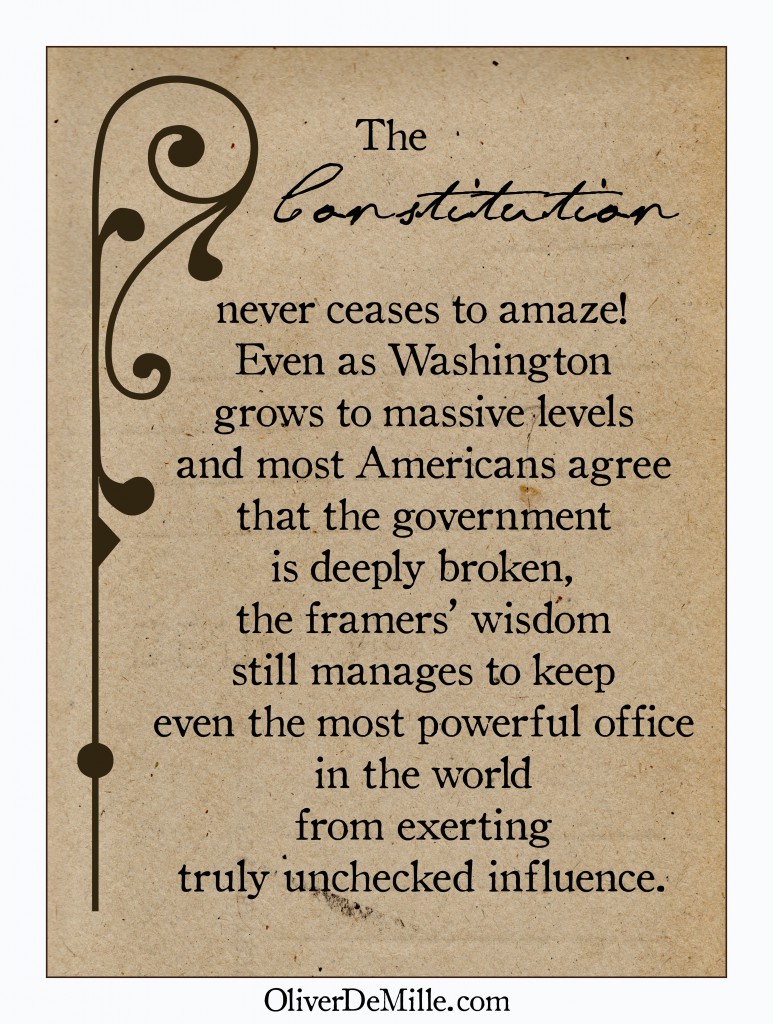 Madison wanted a divided government (3 branches competing against each other, as well as the state and federal levels closely watching the excesses of the other), and the constitutional system is at least partially still working in this way. To have Democrats checking Democrats and Republicans checking each other brings an extra smile to many independents. If a Republican were in the White House, a major international crisis could bring the GOP together in support of the President, but it doesn’t seem likely that anything similar will help President Obama. In fact, international affairs seem to be the focal point of the Democratic divisions.
Madison wanted a divided government (3 branches competing against each other, as well as the state and federal levels closely watching the excesses of the other), and the constitutional system is at least partially still working in this way. To have Democrats checking Democrats and Republicans checking each other brings an extra smile to many independents. If a Republican were in the White House, a major international crisis could bring the GOP together in support of the President, but it doesn’t seem likely that anything similar will help President Obama. In fact, international affairs seem to be the focal point of the Democratic divisions.
The most powerful “Tea Party” work seems to be occurring among a growing number of Democrats who are committed to checking what they consider to be excesses of the current Administration.
The Constitution never ceases to amaze! Even as Washington grows to massive levels and most Americans agree that the government is deeply broken, the framers’ wisdom still manages to keep even the most powerful office in the world from exerting truly unchecked influence. This must be frustrating to those in power. Bravo Madison, Dickinson, Franklin and all your colleagues. Bravo!
Of course, if the framers were here today, they’d no doubt point out that this will only last so long. If we don’t become the kind of citizen-leaders they were, we will lose the rest of our freedoms—sooner rather than later.
(If you haven’t read Oliver DeMille’s new book, We Hold These Truths To Be Self-Evident, this is a great place to start! This may be one of the most important books so far in the 21st Century. It is truly a Must Read!)
 Oliver DeMille is the New York Times, Wall Street Journal and USA Today bestselling co-author of LeaderShift: A Call for Americans to Finally Stand Up and Lead, the co-founder of the Center for Social Leadership, and a co-creator of TJEd.
Oliver DeMille is the New York Times, Wall Street Journal and USA Today bestselling co-author of LeaderShift: A Call for Americans to Finally Stand Up and Lead, the co-founder of the Center for Social Leadership, and a co-creator of TJEd.
Among many other works, he is the author of A Thomas Jefferson Education: Teaching a Generation of Leaders for the 21st Century, The Coming Aristocracy, and FreedomShift: 3 Choices to Reclaim America’s Destiny.
Oliver is dedicated to promoting freedom through leadership education. He and his wife Rachel are raising their eight children in Cedar City, Utah
Category : Blog &Citizenship &Community &Constitution &Culture &Current Events &Government &Leadership &Liberty &Politics

